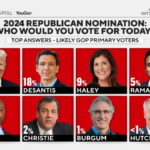- A look at Trump’s primary challengers, his alliances, and how he’s shaping the GOP nomination process.
Trump and the 2024 GOP Primary: Competitors and Allies
Donald Trump’s dominance in the 2024 GOP primary has reshaped the Republican nomination process, with his influence casting a long shadow over his competitors. Trump’s unique role, as a former president running for re-election, places him in an unusual position compared to traditional primary candidates, effectively making him the “incumbent” among GOP hopefuls. The dynamics of Trump’s primary campaign are marked by strategic alliances, familiar rivalries, and influence over party direction. Here’s a closer look at his competitors, alliances, and how Trump’s presence is shaping the GOP primary landscape.
Trump’s Key Competitors in the 2024 Primary
While Trump remains the frontrunner, several notable GOP candidates have entered the race, each hoping to present a compelling alternative to his leadership. Key challengers include:
